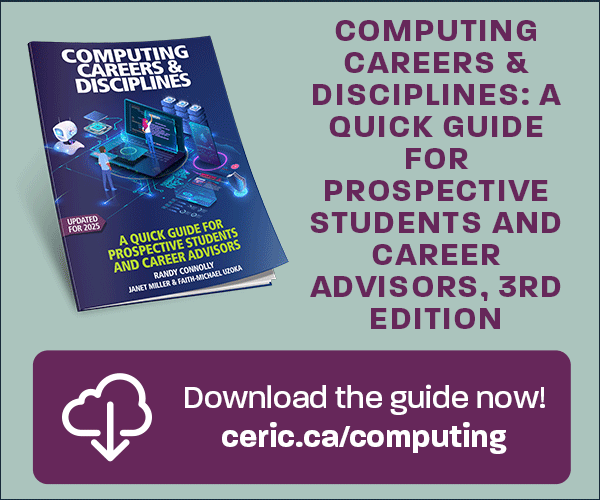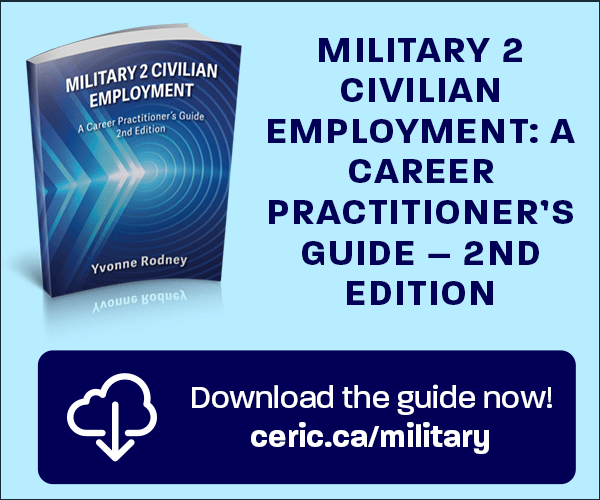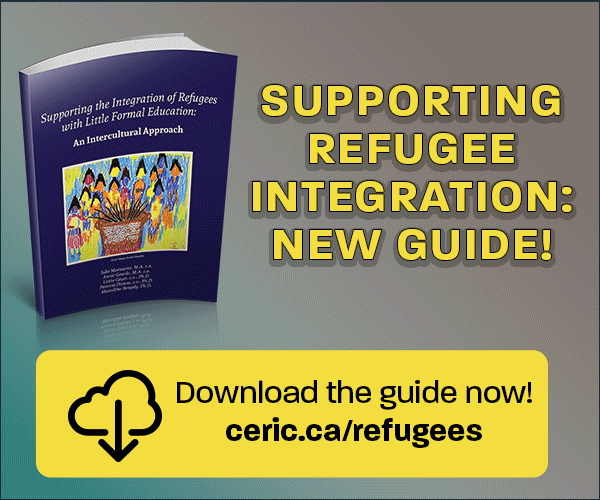Burnout and Vocational Indecision: Psychological Flexibility as Leverage for Intervention
Keywords:
Work, Psychology, InterventionAbstract
Au moment de définir son projet vie-carrière, la personne se voit souvent confrontée à faire des choix. Cette situation, qui engendre des moments d’incertitude, l’amène souvent à vivre un état d’indécision vocationnelle. À son tour, cette indécision peut mener à des difficultés d’ordre psychologique, dont l’épuisement professionnel. Par ailleurs, la flexibilité psychologique contribue au bien-être et à la santé psychologique de la personne, en plus d’être considérée comme une habileté essentielle à la tâche d’exploration et à la construction d’un projet vie-carrière. Afin de mieux connaître la nature des relations qui existent entre l’indécision vocationnelle, l’épuisement professionnel et la flexibilité psychologique, une recherche quantitative a permis d’interroger 318 étudiantes et étudiants universitaires de premier cycle par rapport à chacune de ces trois variables. Les résultats de l’étude révèlent que les personnes indécises et épuisées sont moins portées à être flexibles sur le plan psychologique. Les résultats permettent aussi d’avancer que la flexibilité psychologique, qui agit comme variable médiatrice dans le modèle à l’étude, pourrait s’avérer un levier d’intervention prometteur pour le domaine du développement.
References
Amir, T. et Gati, I. (2006). Facets of career decision-making difficulties. British Journal of Guidance & Counseling, 34(4), 483-503. doi : 10.1080/03069880600942608
Baron, R. M. et Kenny, D. A. (1986). The moderator-mediator variable distinction in social psychological research : Conceptual, strategic, and statistical considerations. Journal of Personality and Social Psychology, 51(6), 1173-1182. doi : 10.1037/0022-3514.51.6.1173
Bond, F. W., Flaxman, P. E. et Bunce, D. (2008). The influence of psychological flexibility on work redesign : Mediated moderation of a work reorganization intervention. Journal of Applied Psychology, 93(3), 645-654. doi : 10.1037/0021-9010.93.3.645
Bond, F. W., Hayes, S. C., Baer, R. A., Carpenter, K. M., Guenole, N., Orcutt, H. K., ... Zettle, R. D. (2011). Preliminary psychometric properties of the Acceptance and Action Questionnaire–II : A revised measure of psychological inflexibility and experiential avoidance. Behavior Therapy, 42(4), 676-688. doi : 10.1016/j.beth.2011.03.007
Boudreau, D., Santen, S.A., Hemphill, R.R. et Dobson, J. (2004) Burnout in medical students : Examining the prevalence and predisposing factors during the four years of medical school. Annals of Emergency Medicine, 44(4), 75–76. doi : 10.1016/j.annemergmed.2004.07.248
Brown, K. W., Ryan, R. et Creswell, J. D. (2007). Mindfulness : Theoretical foundations and evidence for its salutary effects. Psychological Inquiry, 18(4), 211-237. doi : 10.1080/10478400701598298
Campagna, C. et Curtis, G. J. (2007). So worried I don't know what to be : Anxiety is associated with increased career indecision and reduced career certainty. Australian Journal of Guidance & Counseling, 17(1), 91-96. doi : 10.1375/ajgc.17.1.91
Cayer, M. et Baron, L. (2006). Développer un leadership postconventionnel par une formation à la présence attentive. Revue québécoise de psychologie, 27(1), 257-271.
Cournoyer, L. et Lachance, L. (2018). L’ado en mode décision. Québec : Septembre éditeur.
Creed, P., Prideaux, L. A. et Patton, W. (2005). Antecedents and consequences of career decisional states in adolescence. Journal of Vocational Behavior, 67(3), 397-412. doi : 10.1016/j.jvb.2004.08.008
Daniels, L. M., Stewart, T. L., Stupnisky, R. H., Perry, R. P. et LoVerso, T. (2011). Relieving career anxiety and indecision : The role of undergraduate students’ perceived control and faculty affiliations. Social Psychology of Education, 14(3), 409-426. doi : 10.1007/s11218-010-9151-x
Divaris, K., Polychronopoulou, A., Taoufik, K., Katsaros, C. et Eliades, T. (2012). Stress and burnout in postgraduate dental education. European Journal of Dental Education, 16(1), 35-42. doi : 10.1111/j.1600-0579.2011.00715.x
Dosnon, O. (1996). L’indécision face au choix scolaire ou professionnel : concepts et mesures. L’orientation scolaire et professionnelle, 25(1), 129-168.
Dryman, M. T., Gardner, S., Weeks, J. W. et Heimberg, R. G. (2016). Social anxiety disorder and quality of life : How fears of negative and positive evaluation relate to specific domains of life satisfaction. Journal of Anxiety Disorders, 38, 1-8.
Dyrbye, L. N., Thomas, M. R., Power, D. V., Durning, S., Moutier, C., Massie, F. R., ... Shanafelt, T. D. (2010). Burnout and serious thoughts of dropping out of medical school : A multi-institutional study. Academic Medicine, 85(1), 94-102. doi : 10.1097/ACM.0b013e3181c46aad
Falardeau, I. (2007). Sortir de l'indécision. Québec : Septembre éditeur.
Falardeau, I. (2012). J'enseigne, ils s'orientent : Pour une pédagogie orientante au collégial. Québec : Septembre éditeur.
Faurie, I. et Giacommetti, N. (2017). Effets de l’indécision de carrière et du sentiment d’efficacité personnelle sur le vécu de la transition lycée-université. L’orientation scolaire et professionnelle, 46(2). doi : 10.4000/osp.5378
Flaxman, P. E. et Bond, F. W. (2010). A randomised worksite comparison of acceptance and commitment therapy and stress inoculation training. Behaviour Research and Therapy, 48(8), 816-820. doi : 10.1016/j.brat.2010.05.004
Forner, Y. (2007). L’indécision de carrière des adolescents. Travail Humain, 70(3), 213-234.
Fritz, M. S. et MacKinnon, D. P. (2007). Required sample size to detect the mediated effect. Psychological Science, 18(3), 233-239. doi : 10.1111/j.1467-9280.2007.01882.x
Garcia, P. R. J. M., Restubog, S. L. D., Bordia, P., Bordia, S. et Roxas, R. E. O. (2015). Career optimism : The roles of contextual support and career decision-making self-efficacy. Journal of Vocational Behavior, 88, 10-18. doi:10.1016/j.jvb.2015.02.004
Gati, I. (2013). Advances in career decision making. In W. B. Walsh, M. L. Savickas et P. J. Hartung (dir.), Handbook of vocational psychology (4e éd., p. 183-215). New-York, NY : Routledge.
Gelatt, H. B. (1989). Positive uncertainty : A new decision-making framework for counseling. Journal of Counseling Psychology, 36(2), 252-256. doi : 10.1037/0022-0167.36.2.252
Gelatt, H. B. et Gelatt, C. (2003). Creative decision making using positive uncertainty. Boston, MA : Crisp Learning.
Grégoire, S., Baron, C. et Baron, L. (2012). Pleine conscience et counseling. Revue canadienne de counseling et de psychothérapie, 46(2), 161-177.
Grégoire, S., Lachance, L. et Richer, L. (dir.). (2016). La présence attentive. Mindfulness. État des connaissances théoriques, empiriques et pratiques. Québec : Presses de l’Université du Québec.
Guay, F., Ratelle, C., Senécal, C., Larose, S. et Deschênes, A. (2006). Distinguishing developmental from chronic career indecision : Self-efficacy, autonomy, and social support. Journal of Career Assessment, 14(2), 235-251. doi : 10.1177/1069072705283975
Hartung, P. J., Porfeli, E. J. et Vondracek, F. W. (2008). Career adaptability in childhood. The Career Development Quarterly, 57(1), 63-74. doi : 10.1002/j.2161-0045.2008.tb00166.x
Hayes, A. F. (2009). Beyond Baron and Kenny : Statistical mediation analysis in the new millennium. Communication Monographs, 76(4), 408-420.
Hayes, S. C. (1987). A contextual approach to therapeutic change. In N. Jacobson (dir.), Psychotherapists in clinical practice (p. 327-387). New York : Guilford Press.
Hayes, S. C., Luoma, J. B., Bond, F. W., Masuda, A. et Lillis, J. (2006). Acceptance and commitment therapy : Model, processes and outcomes. Behavior Research and Therapy, 44(1), 1-25. doi : 10.1016/j.brat.2005.06.006
Hayes, S. C., Strosahl, K. D. et Wilson, K. G. (1999). Acceptance and commitment therapy : An experiential approach to behavior change. New York, NY : Guilford Press.
Heeren, A. et Philippot, P. (2010). Les interventions basées sur la pleine conscience : une revue conceptuelle et empirique. Revue québécoise de psychologie, 31(3), 37-61.
Johnson, R. R. B. et Christensen, L. B. (2012). Educational research : Quantitative, qualitative, and mixed approaches (4e éd.). Thousand Oaks, CA : Sage Publications.
Kashdan, T. B. et Rottenberg, J. (2010). Psychological flexibility as a fundamental aspect of health. Clinical Psychology Review, 30(7), 865-878. doi : 10.1016/j.cpr.2010.03.001
Krumboltz, J. D. (2009). The happenstance learning theory. Journal of Career Assessment, 17(2), 135-154.
Krumboltz, J. D., Foley, P. F. et Cotter, E. W. (2013). Applying the happenstance theory to involuntary career transitions. The Career Development Quarterly, 61(1), 15-26.
Levin, M. E., Pistorello, J., Seeley, J. R. et Hayes, S. C. (2014). Feasibility of a prototype web-based acceptance and commitment therapy prevention program for college students. Journal of American College Health, 62(1), 20-30. doi : 10.1080/07448481.2013.843533
Lloyd, J., Bond, F. W. et Flaxman, P. E. (2013). The value of psychological flexibility : Examining psychological mechanisms underpinning a cognitive behavioural therapy intervention for burnout. Work and Stress, 27(2), 181-199. doi : 10.1080/02678373.2013.782157
Martin, F., Sabourin, S., Laplante, B. et Coallier, J.-C. (1991). Diffusion, support, approach, and external barriers as distinct theoretical dimensions of the career decision scale : Disconfirming evidence? Journal of Vocational Behavior, 38(2), 187-197. doi : 10.1016/0001-8791(91)90026-I
Maslach, C. et Jackson, S. E. (1981). The measurement of experienced burnout. Journal of Occupational Behaviour, 2(2), 99-113. doi : 10.1002/job.4030020205
Mazurkiewicz, R., Korenstein, D., Fallar, R. et Ripp, J. (2012). The prevalence and correlations of medical student burnout in the pre-clinical years : A cross-sectional study. Psychology, Health & Medicine, 17(2), 188-195. doi : 10.1080/13548506.2011.597770
Ménard, J. et Beresford, B. (2016). Interventions basées sur la présence attentive. In S. Grégoire, L. Lachance et L. Richer (dir.), La présence attentive mindfulness. État des connaissances théoriques, empiriques et pratiques (p. 71-90). Québec : Presses de l’Université du Québec.
Monestès, J. L., Villatte, M., Mouras, H., Loas, G. et Bond, F. W. (2009). Traduction et validation française du questionnaire d’acceptation et d’action (AAQ-II). Revue européenne de psychologie appliquée, 59(4), 301-308. doi : 10.1016/j.erap.2009.09.001
Moneta, G. B. (2011). Need for achievement, burnout, and intention to leave : Testing an occupational model in educational settings. Personality and Individual Differences, 50(2), 274-278. doi : 10.1016/j.paid.2010.10.002
Muto, T., Hayes, S. C. et Jeffcoat, T. (2011). The effectiveness of acceptance and commitment therapy bibliotherapy for enhancing the psychological health of Japanese college students living abroad. Behavior Therapy, 42(2), 323-335. doi : 10.1016/j.beth.2010.08.009
Nunnally, J. C. et Bernstein, I. H. (1994). Psychometric theory. New York: McGraw-Hill.
Osipow, S. H. (1987). Manual for the Career Decision Scale. Odessa, FL : Psychological Assessment Resources.
Osipow, S. H. (1999). Assessing career indecision. Journal of Vocational Behavior, 55(1), 147-154. doi : 10.1006/jvbe.1999.1704
Pelham, B. W. et Blanton, H. (2007). Conducting research in psychology : Measuring the weight of smoke (3e éd.). Belmont, CA : Wadsworth Cengage Learning.
Pelletier, L. G., Boivin, M. et Alain, M. (2000). Les plans de recherche corrélationnels. In R. J. Vallerand et U. Hess (dir.), Méthodes de recherche en psychologie (p. 193-238). Boucherville, QC : Gaëtan Morin éditeur.
Pelletier, D. et Bujold, C. E. (1984). Pour une approche éducative en orientation. Chicoutimi, QC : Gaëtan Morin éditeur.
Pelletier, D., Noiseux, G., et Bujold, C. E. (1974). Développement vocationnel et croissance personnelle : approche opératoire. Montréal : McGraw-Hill.
Picard, F. (2012). Reducing academic and career indecision : The effectiveness of a first-year college program. The Online Journal of Counseling and Education, 1(3), 71-83.
Pienaar, J. et Sieberhagen, C. (2005). Burnout and engagement of student leaders in a higher education institution. South African Journal of Higher Education, 19(1), 155-166.
Polk, K., Schoendorff, B., Webster, M. et Olaz, F. (2017). Guide de la matrice ACT. Belgique : De Boeck supérieur.
Prett, M. A., Lackey, N. R. et Sullivan, J. J. (2003). Making sense of factor analysis. The use of factor analysis for instrument development in health care research. Thousand Oaks, CA : Sage.
Prins, J. T., Hoekstra‐Weebers, J. E., Gazendam‐Donofrio, S. M., Dillingh, G. S., Bakker, A. B., Huisman, M., ... Van Der Heijden, F. M. (2010). Burnout and engagement among resident doctors in the Netherlands : A national study. Medical Education, 44(3), 236-247. doi : 10.1111/j.1365-2923.2009.03590.x
Rassin, E. et Muris, P. (2005). To be or not to be . . . indecisive : Gender differences, correlations with obsessive-compulsive complaints, and behavioral manifestation. Personality and Individual Differences, 38(5), 1175–1181. doi : 10.1016/j.paid.2004.07.014
Salanova, M., Schaufeli, W., Martínez, I. et Bresó, E. (2010). How obstacles and facilitators predict academic performance : The mediating role of study burnout and engagement. Anxiety, Stress & Coping, 23(1), 53-70. doi : 10.1080/10615800802609965
Savickas, M. L. (2002). Career construction : A developmental theory of vocational behavior. In D. Brown et associés (dir.), Career choice and development (4e éd., p. 149-205). San Francisco, CA : Jossey-Bass.
Savickas, M.L., Nota, L., Rossier, J., Dauwalder, J.-P., Duarte, M.E., Guichard, J., Soresi, S., Van Esbroeck, R., van Vianen, A. E.M. et Bigeon, C. (2010). Construire sa vie (Life designing) : un paradigme pour l’orientation du 21e siècle. L’orientation scolaire et professionnelle, 39(1), 5-39.
Schaufeli, W. B., Martínez, I. M., Pinto, A. M., Salanova, M. et Bakker, A. B. (2002). Burnout and engagement in university students : A cross-national study. Journal of Cross-Cultural Psychology, 33(2), 464–481. doi : 10.1177/0022022102033005003
Statistique Canada. (2015). Tendances liées au choix de carrière des jeunes Canadiens et les études postsecondaires qui lui sont associées (No 81-599-X au catalogue). Repéré en ligne le 25 novembre 2019 de https://www150.statcan.gc.ca/n1/fr/pub/81-599-x/81-599-x2015010-fra.pdf?st=5nrPweiH.
Walker, J. V. I. I. I. et Peterson, G. W. (2012). Career thoughts, indecision, and depression : Implications for mental health assessment in career counseling. Journal of Career Assessment, 20(4), 497-506. doi : 10.1177/1069072712450010
Walker, T. L. et Tracey, T. J. G. (2012). The role of future time perspective in career decision-making. Journal of Vocational Behavior, 81(2), 150-158. doi : 10.1016/j.jvb.2012.06.002
Walsh, B. W., Savickas, M. L. et Hartung, P. J. (2013). Handbook of vocational psychology. Theory, research, and practice (4e éd.). New-York, NY : Routledge.
Xu, H. et Tracey, T. J. (2014). The role of ambiguity tolerance in career decision making. Journal of Vocational Behavior, 85(1), 18-26. doi : 10.1016/j.jvb.2014.04.001
Yu, C. M. (2019). A theoretical framework for understanding social anxiety in the context of career development. Revue Canadienne de développement de carrière, 18(1), 20-31.
Zhou, D. et Santos, A. (2007). Career decision-making difficulties of British and Chinese international university students. British Journal of Guidance & Counselling, 35(2), 219-235. doi : 10.1080/03069880701256684
Zunker, V. G. (2008). Career, work, and mental health : Integrating career and personal counseling. Thousand Oaks, CA : Sage.
Zunker, V. G. (2016). Career counseling : A holistic approach (9e éd.). Boston, MA : Cengage Learning.

Downloads
Published
How to Cite
Issue
Section
License
Copyright (c) 2020 CANADIAN JOURNAL OF CAREER DEVELOPMENT

This work is licensed under a Creative Commons Attribution-NonCommercial-NoDerivatives 4.0 International License.
















